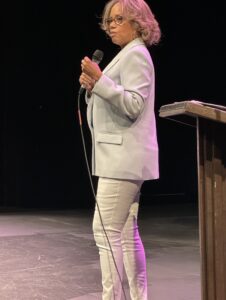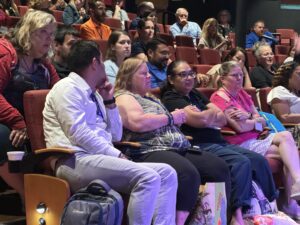At Florida teacher meeting, the keynote speaker tells the story of her ancestors: A founding father and an enslaved mother.
By Johannes Werner
Original Air Date: July 31, 2024
Host: More than 120 teachers from throughout the state gathered at Sarasota’s West Coast Black Theater on Friday and Saturday for the annual conference of the Florida Council for History Education. Controversies are swirling around book bans, the prohibition of teaching certain race-related theories, new teaching standards, and government support for parents who object to what’s taught in the classroom. The teaching of history is probably the most contested terrain. That should produce anxiety among teachers. But I saw little of that at the conference. Quite the contrary – I saw a focus on the history of minorities, and on opportunities to teach diversity and inclusion.
Johannes Werner: Sally Hemings, the slave owned by Thomas Jefferson and the mother of six of his children, offers a teaching opportunity. That’s the takeaway from the keynote speech by Gayle Jessup White in a packed Donelly Theatre.
Triggered by family lore, Jessup White delved into serious research about her family history, which led to her book titled “Reclamation: Sally Hemings, Thomas Jefferson, and a Descendant’s Search for Her Family’s Lasting Legacy”. She then became the first public relations officer of the Thomas Jefferson Foundation, which operates Monticello, the Virginia estate of the Jefferson family.
At some point of her keynote speech, Gayle Jessup White showed a group photo of some 50 people of all ages and skin colors posing in front of Monticello. They are the offspring of Thomas Jefferson and Sally Hemings.

Gayle Jessup White
Gayle Jessup White: This is my DNA family. At part of every other year at Monticello, we have a family reunion where hundreds of us who are descended from those enslaved at Monticello, who literally built Monticello, who literally made that happen, who are very much a part of American history, whose families went on to build UVA, University of Virginia, whose black connections helped build the nation’s capital, the monument, the White House, the U.S. Capitol building. This is something that needs to be recognized. These are names that need to be risen and celebrated as contributors to American history. This is telling the truth, ultimately telling the truth so we can know who we are as a whole people.
JW: Gayle Jessup White went on to talk about how far we have come, with a Black president, and possibly a Black woman president now.
GJW: So we can think of that as America’s greatness. It’s easy to look back and go, “Oh yeah, America’s original sin. We took this land from Native Americans and we enslave people. And there’s the Chinese Exclusion Act, et cetera, et cetera.” But we can also look at the positive side and say, “Wow, look what we’ve done with women’s rights and gay rights and civil rights.” That speaks to who we are as Americans. And I think that’s just wonderful. And that’s something to be celebrated and to be proud of. And with that, amen, I shall close.
JW: Jean Faulk is a board member of the Florida Council for History Education. She also teaches history at Bayshore High in Manatee County. She believes young teachers are the ones most affected by the current climate.
Jean Faulk: Young teachers take everything to heart that’s printed, because they’re young and they’re new teachers. And they also worry that if they don’t follow the directions to the T that they’re going to lose their job. When you’re a more mature teacher, like I am, a seasoned teacher, I pretty much would invite them to fire me if they came at me with, “You’re not teaching what we want you to teach.” We have standards that we are supposed to follow. We are also educated. There are ways to teach the standards to cover what we need to cover without stepping on anyone’s toes.
JW: Parental involvement is actually something she yearns for as a teacher.
JF: You cannot show bias, you can’t walk in a classroom and say, “Our president is an idiot,” or, “Our president is an angel.” You can’t, you have to not try to project your personal feelings onto the students. You have to give them both sides of the story. And I, because I teach high school, love to invite my students to look it up. Because that was the best advice I ever got from my parents. Because of the school that I teach in, sometimes we have problems getting parents involved. I would love for parents to come up and say, “I don’t like what you’re teaching my child.” Just because I would know that they had parental involvement.
JW: She agrees that Sally Hemings’ and Thomas Jefferson’s story is very important. How would she include it in her curriculum?
JF: We are all humans, and we all do things sometimes that are not acceptable to society. Thomas Jefferson had his little … He was not a perfect man, as she said, he was a man. He had chances to change, and that is an argument that we hear quite a bit: “Yeah, but  Thomas Jefferson, he would have changed, but it was the way of the world at that time.” Well, you know what, guess what? He never tried. That was, to me, an excuse that our founding fathers used many times over to excuse their behavior. Do we do that today? Give me some examples of how we do that today.
Thomas Jefferson, he would have changed, but it was the way of the world at that time.” Well, you know what, guess what? He never tried. That was, to me, an excuse that our founding fathers used many times over to excuse their behavior. Do we do that today? Give me some examples of how we do that today.
Put it back on the students. One of the things that I think that many, many parents and politicians do not understand is, our students are not stupid, and they ask questions. And they ask questions that are related to historical things. And they know if we’re lying. And if you lie to them, or you try to gloss over the truth, they will never trust you again. And then you’ve lost that student. And our job is to educate the students, not to indoctrinate them as they accuse many teachers of doing, but to educate them and let them think for themselves.
JW: This has been Johannes Werner, reporting for WSLR News.
WSLR News aims to keep the local community informed with our 1/2 hour local news show, quarterly newspaper and social media feeds. The local news broadcast airs on Wednesdays and Fridays at 6pm.